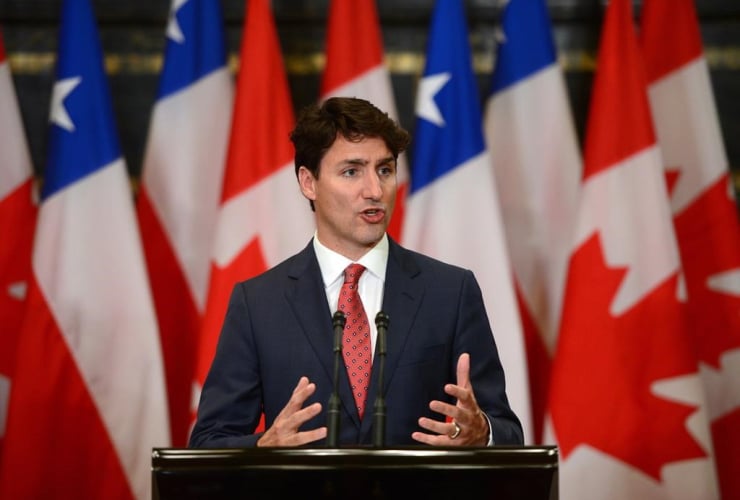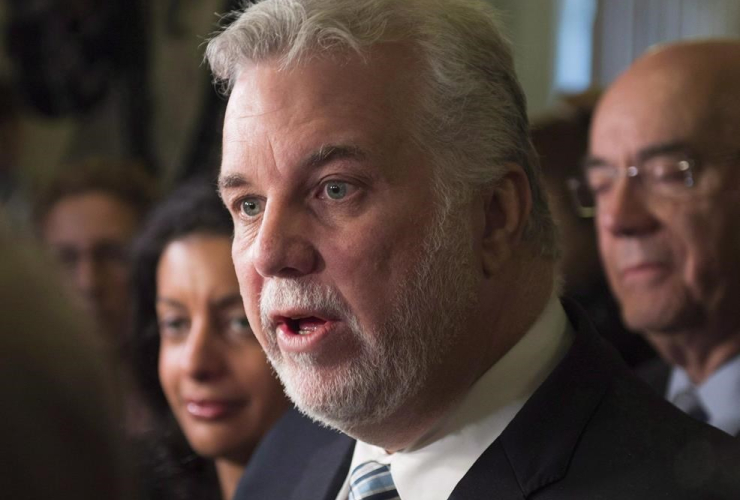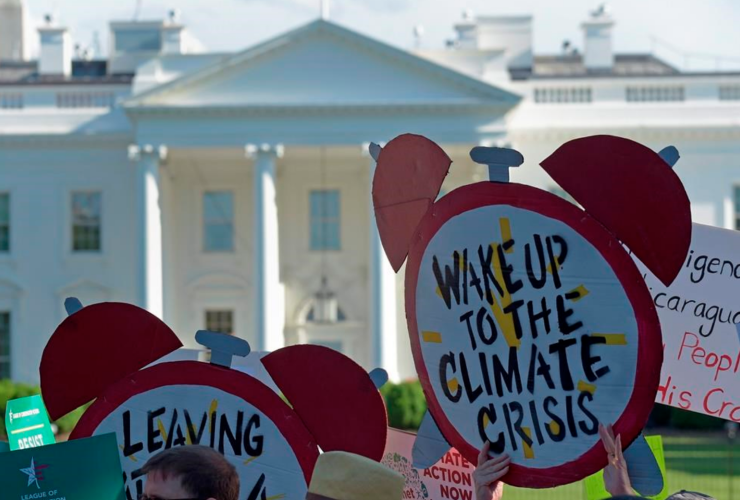Prime Minister Justin Trudeau says he didn’t suggest removing the Paris Agreement on climate change from an international statement in order to "appease" U.S. President Donald Trump, as German magazine Der Spiegel has reported.
Trudeau rejected an attempt to isolate climate-doubting Trump over his June 1 announcement that the United States would withdraw from the Paris Agreement, according to the Hamburg-based news agency. The prime minister was concerned about provoking Washington, the report said.
Trudeau himself insisted in Parliament on Monday that “no, I did not say that.”
His office said it had asked the news agency for a correction, and called the article’s "characterization” incorrect. Environment Minister Catherine McKenna also called the article an “incorrect translation" on Monday.
The German report casts doubt on the Liberal government’s attempt to portray itself as a champion of the Paris Agreement, a 2015 global deal signed in the French capital to limit the pollution that contributes to climate change.
Trudeau’s government spearheaded a recent declaration by Canada's Parliament in favour of the Paris pact, for example, and Trudeau joined five other G7 country leaders in Italy on May 27 in an effort to persuade Trump to remain in the agreement.
Trudeau's office has also been touting the prime minister's diplomatic moves to reach out to other global leaders to take action on climate change.
Nearly 150 countries, including Canada, have ratified the Paris Agreement which calls for action to reduce pollution that traps heat in the atmosphere and to help developing countries adapt to climate change and cope with threats to their survival.
The U.S. is still a member, as an official withdrawal isn't permitted for a three-year period after the deal enters into force, meaning the earliest Trump could start the process is in 2019.
Der Spiegel reported that in a phone call, Trudeau asked German Chancellor Angela Merkel whether there would be anything wrong with removing references to the Paris Agreement from an upcoming G20 statement on climate change. Merkel hosts the G20 in Hamburg next month.
"He (Trudeau) suggested simply limiting the statement to energy issues, something that Trump would likely support as well," reads the report. "Trudeau had apparently changed his approach to Trump and seemed concerned about further provoking his powerful neighbour to the south."
Trudeau spokesman Cameron Ahmad wrote in emailed comments Monday morning that "the characterization in this article is incorrect."
"I would point you the prime minister's recent comments and statements regarding the Paris Agreement and climate change," wrote Ahmad.
He included Trudeau's visit to La Malbaie, Que., the site of the next G7 summit, where the prime minister said he expects to showcase Canada's commitment to fight climate change.
Later on Monday, during Question Period in the House of Commons, NDP Leader Tom Mulcair asked Trudeau about the accuracy of the report. Trudeau first reiterated his government’s support for fighting climate change, then denied that he said what was in the report.
Ahmad said the government has reached out to the news agency to ask for a correction.
‘Do you want to really isolate the United States?’
The G7 had noted in its general communiqué on May 27 that the U.S. was “not in a position to join the consensus” on Paris but said the six other countries “reaffirm their strong commitment” to the deal.
But even that group, Der Spiegel reported, may be on thin ice. United Kingdom Prime Minister Theresa May, it said, along with Japanese Prime Minister Shinzo Abe, were also wavering from making a strong statement in support of the Paris Agreement to avoid alienating Donald Trump.
The magazine portrayed Trudeau's position as a key factor that would make it difficult for other countries to pressure the U.S. to do more on climate change. But it also reported that the leaders of Italy and France were aligning themselves with Merkel in their efforts to defend the Paris Agreement.
On Monday, McKenna said Canada would not support renegotiating Paris, something Trump has said he would be open to pursuing. She said she asked Scott Pruitt, administrator of the U.S. Environmental Protection Agency, on the sidelines of the G7 to “clarify” its position.
"I made it clear that the Paris agreement is not open for renegotiation, although we are in the phase of negotiating the rules,” said McKenna.
Catherine Abreu, executive director of Climate Action Network Canada, said the global community was paying closer attention than ever to multilateral negotiations, to see if countries are going to stand up to Trump on the issue of climate change.
“The reason that mentioning Paris in the G20 statement, and continuing to mention Paris in all of the G7 statements, is important is to affirm to the global community, including businesses, industry and investors that we’re on track,” she said.
While countries have to actually put the work in themselves, the Paris Agreement does bring countries around together on a shared agenda. “Maintaining that is important,” she said.
It was worth noting, however, that a G7 statement was still possible as the U.S. was still participating, she added.
“That, to me, means that the U.S. is actually interested in continuing to have these conversations, even though they go into them from a very different standpoint than we’re used to countries going into them,” Abreu told National Observer.
Former Canadian diplomat and veteran Canada-U.S. analyst Colin Robertson said a Canadian approach that looked for commonality with the U.S. would be consistent with recent efforts by Canada to frame its cross-border relationship in this way.
Canada’s June 6 foreign policy statement said that while the country would have to "set our own clear and sovereign course," it would do so "with open hands and open hearts extended to our American friends, seeking to make common cause,” he noted.
“Do you want to really isolate the United States? Or do you hope that you can find areas where you can accommodate one another without putting a stick in the eye?” he said.
Trudeau’s hesitation may also be due to a desire not to rock the boat before NAFTA replacement talks begin, set for August, he said. Normally, two issues like trade talks and official statements on climate change wouldn’t be linked, he argued.
But with Trump, “everything’s linked...with Trump, everything is personal.”
Climate action is also proceeding at the state and provincial level, he said, something Canada appears to be encouraging. Canada has a “broad strategy” to work “directly with American states and cities on global warming,” according to a June 7 New York Times report. It said the Trudeau government had come to the conclusion that the Trump administration was unlikely to reverse its stand on climate change.
— with files from Mike De Souza
Did I miss something in this
Did I miss something in this article? Trump's administration is not the only entity to appease. In fact, the Trump Show has come and will go. What stays constant, however, is ruling establishment. Trudeau must appease the oil and gas (O&G) industry and the big banks and hedge funds that fund the O&G industry. They fund his political party; they also fund the conservatives. 'Ya gotta dance with the one that brung ya,' goes the saying.
It would be a terrific contribution if the National Observer researched and published an in-depth report on the connection between the O&G industry and party funding; the industry and individual politicians (junkets, perks, golf games, conjoint vacations, etc.); and the correlation between O&G industry political largess and project approval; and the correlation between the largess and deregulation/regulatory capture.
That's a book, I know. But we don't have time for a book. Perhaps a series.
Best,
David
I reiterate the comment I
I reiterate the comment I made to an earlier NO article concerning the hearing design for the TransCanada proposed Energy East Project.
The meetings TransCanada holds with elected officials, include those such as the following invitation sent out last week to elected officials
From: Eastern Mainline :
You're Invited! Come join us on Saturday, June 3 and talk to a TransCanada representative about how we’re making a difference in your community. Evening Reception 5:30 – 9:00 p.m. Governor General Ballroom, 4th floor Westin Ottawa.
Obviously influence peddling is commonplace, and this is a small potatoes occurrence, compared to the largess of usual practices.
Without an objective witness
Without an objective witness to the conversation, it's anyone's guess what was actually said.
Regardless, Trump is a bully to be reckoned with by a united front.
All signatories to the Paris Agreement must be resolute, despite the bully elephant in the room.
It's handy that Trump keeps
It's handy that Trump keeps acting like a buffoon and helping governments deflect attention from their own scandals. The Paris Agreement can't be renegotiated, because it is completely voluntary, has no oversight on compliance, and no penalties for failure other than climate change armageddon. UN scientists announced months ago that even if every country met all targets, it would still only be half of what is needed to keep warming under 2 degrees, never mind the 1.5 that Trudeau claimed to want. While pointing fingers at the US, Trudeau gets to ignore the fact that Canada (Alberta, specifically) is by far the world's worst emitter of GHGs and has passed legislation allowing a 40% increase as part of it's "climate change" plan. Trudeau continues to rubber stamp massive tarsand expansion, LNG, pipelines and multi-billion dollar industry subsidies, all the while proclaiming his excellent plan to save the world. Which is actually Harper's plan, since despite years in Opposition protesting how ineffective it is, Trudeau changed nothing when he became PM. Since methane is many times worse than CO2, his recent about-face that delays reduction up to 5 years should be global headlines, but, well, Trump.






Comments